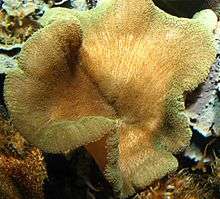Stichodactyla helianthus
| Stichodactyla helianthus | |
|---|---|
 | |
| Scientific classification | |
| Kingdom: | Animalia |
| Phylum: | Cnidaria |
| Class: | Anthozoa |
| Order: | Actiniaria |
| Family: | Stichodactylidae |
| Genus: | Stichodactyla |
| Species: | S. helianthus |
| Binomial name | |
| Stichodactyla helianthus (Ellis, 1768) [1] | |
| Synonyms | |
| |
Stichodactyla helianthus is a sea anemone of the family Stichodactylidae. Helianthus stems from the Greek words ἡλιος (meaning sun), and ἀνθος, meaning flower. S. helianthus is also referred to as the 'sun anemone'. S. helianthus is a large, green, sessile, carpet-like sea anemone, from the Caribbean. It lives in shallow areas with mild to strong currents. The anemone crab (Mithraculus cinctimanus) is often associated with it, being found among the tentacles or on the column and margin of the oral disc.[2]
S. helianthus excretes stichodactyla toxin. It is believed that it excretes toxins mainly to protect itself from the spiny lobster.[3]
References
- ↑ Fautin, Daphne (2012). "Stichodactyla helianthus (Ellis, 1768)". World Register of Marine Species. Retrieved 2012-10-17.
- ↑ Colin, Patrick L. (1978). Marine Invertebrates and Plants of the Living Reef. T.F.H. Publications. p. 367. ISBN 0-86622-875-6.
- ↑ Norton RS, Pennington MW, Wulff H (December 2004). "Potassium channel blockade by the sea anemone toxin ShK for the treatment of multiple sclerosis and other autoimmune diseases". Curr. Med. Chem. 11 (23): 3041–52. doi:10.2174/0929867043363947. PMID 15578998.
This article is issued from Wikipedia - version of the 6/6/2016. The text is available under the Creative Commons Attribution/Share Alike but additional terms may apply for the media files.